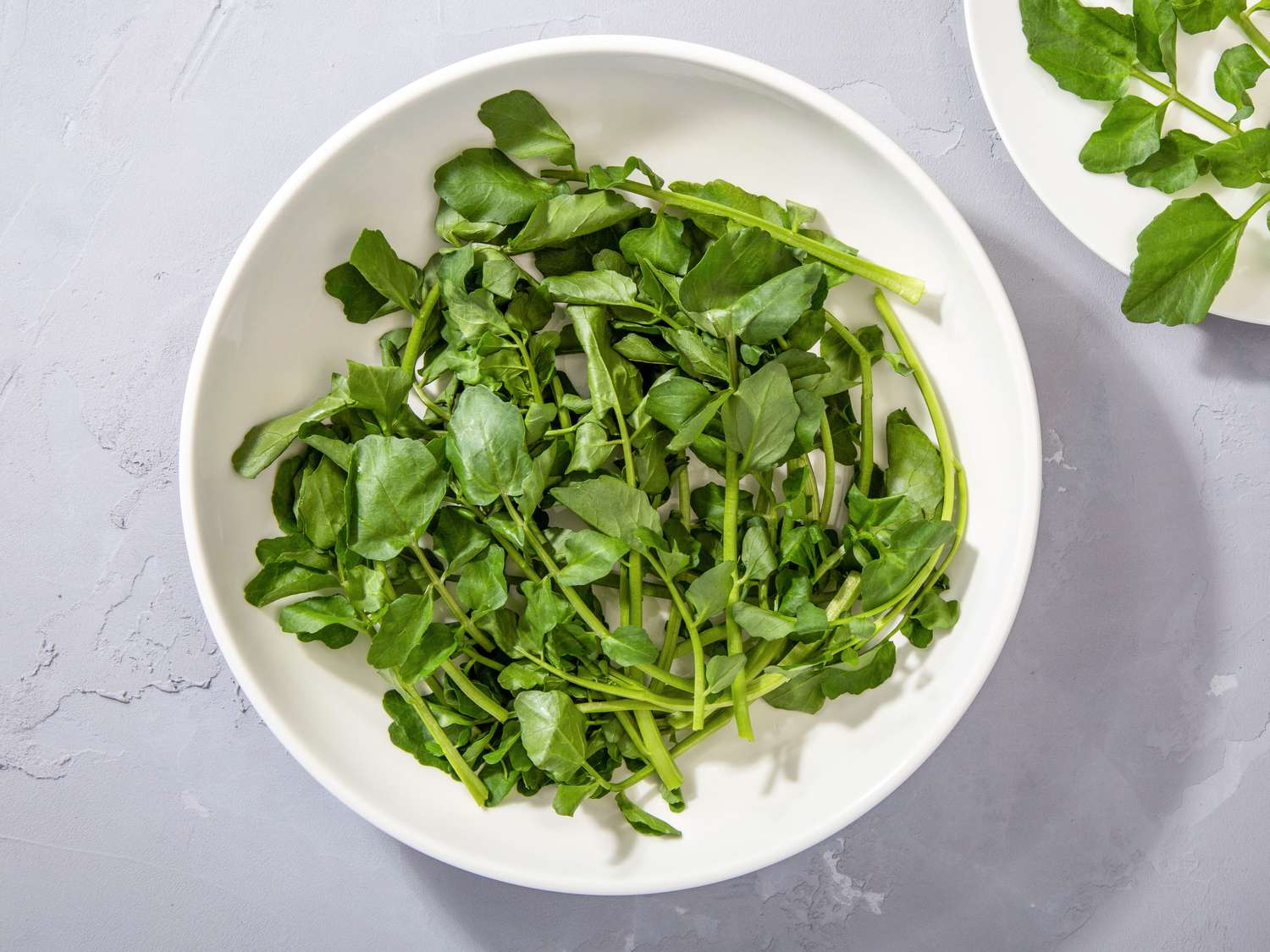
What is the Health Benefits of Watercress?
အောက်ဆုံးထိ ဆွဲကြည့်ပေးကြပါ ခင်ဗျာ
Watercress is a type of vegetable classified in the same family as kale, cabbage, and Brussels sprouts. Watercress may support bone and eye health and enhance athletic performance.
Watercress is an often overlooked leafy green that packs a powerful nutrient punch.
Its small, round leaves and edible stems have a peppery, slightly spicy flavor.
Watercress is part of the Brassicaceae family of vegetables, which also includes kale, Brussels sprouts and cabbage.
Once considered a weed, it was first cultivated in the UK in the early 1800s but is now grown in watery beds throughout the world.
Here are 10 impressive health benefits of watercress.
1. Packed with Nutrients, Particularly Vitamin K
Watercress is low in calories but packs a vast array of nutrients.
Nutrient density is a measure of the nutrients a food contains in relation to how many calories it provides. Therefore, watercress is an extremely nutrient-dense food.
In fact, it’s ranked number one on the US Centers for Disease Control’s Powerhouse Fruits and Vegetables list.
One cup (34 grams) of watercress contains the following:
- Calories: 4
- Carbs: 0.4 grams
- Protein: 0.8 grams
- Fat: 0 grams
- Fiber: 0.2 grams
- Vitamin A: 22% of the
Reference Daily Intake (RDI) - Vitamin C: 24% of the RDI
- Vitamin K: 106% of the RDI
- Calcium: 4% of the RDI
- Manganese: 4% of the RDI
As you can see, one cup (34 grams) of watercress provides over 100% of the RDI for vitamin K, a fat-soluble vitamin necessary for blood clotting and healthy bones.
Watercress also contains small amounts of vitamin E, thiamine, riboflavin, vitamin B6, folate, pantothenic acid, magnesium, phosphorus, potassium, sodium and copper.
2. High Antioxidant Content May Lower Your Risk of Chronic Diseases
Watercress is packed with plant compounds called antioxidants that protect against cell damage caused by free radicals, which are harmful molecules that lead to oxidative stress.
Oxidative stress has been associated with several chronic illnesses including diabetes, cancer and cardiovascular disease.
Fortunately, diets high in antioxidant-rich foods like watercress can help protect against oxidative stress, which may lower your risk of these diseases.
One study on the antioxidant compounds in 12 different cruciferous vegetables found over 40 unique flavonoids, a type of plant chemical, in watercress.
In fact, watercress outperformed all other vegetables in this study in terms of total amount of phenols and the ability to neutralize free radicals.
What’s more, studies have linked the antioxidants in watercress to a lower risk of cancer, diabetes and heart disease.
3. Contains Compounds That May Prevent Certain Types of Cancer
Because watercress is high in phytochemicals, it may reduce your risk of developing certain types of cancer.
Watercress and other cruciferous vegetables contain glucosinolates, which are activated to compounds called isothiocyanates when they’re cut with a knife or chewed.
Isothiocyanates include chemicals such as sulforaphane and phenethyl isothiocyanate (PEITC).
These compounds protect against cancer by safeguarding healthy cells from damage, inactivating carcinogenic chemicals and blocking the growth and spread of tumors.
Isothiocyanates found in watercress have been shown to prevent colon, lung, prostate and skin cancers.
Additionally, research demonstrates that the isothiocyanates and sulforaphane found in watercress suppress the growth of breast cancer cells.
4. Beneficial for Heart Health in Many Impressive Ways
Eating watercress may be beneficial for heart health in several different ways.
- Watercress Is a Cruciferous Vegetable
- Antioxidants Improve Heart Health
- Dietary Nitrates Boost Blood Vessel Health
- Watercress May Lower Cholesterol
5. Mineral and Vitamin K Contents Protect Against Osteoporosis
6. Boosts Immune Function Thanks to High Vitamin C Levels
7. Nutrient Density May Aid Weight Loss
8. Dietary Nitrates May Enhance Athletic Performance
Vegetables in the Brassicaceae family contain high levels of dietary nitrates.
Nitrates are compounds found naturally in foods such as beets, radishes and leafy green vegetables like watercress.
They relax your blood vessels and increase the amount of nitric oxide in your blood, which may improve exercise performance.
What’s more, dietary nitrate lowers resting blood pressure and reduces the amount of oxygen needed during exercise, which may increase exercise tolerance.
Several studies on dietary nitrates from beets and other vegetables have demonstrated improved exercise performance in athletes.
However, a small study in healthy individuals taking 100 grams of watercress daily for seven days found that watercress increased carbon dioxide production during exercise, which may have a negative impact on performance.
While a considerable amount of research indicates that dietary nitrates may enhance exercise performance, conclusive evidence that watercress improves athletic performance is lacking.
9. Rich in Carotenoids and Vitamin C, Which May Protect Eye Health
Watercress contains lutein and zeaxanthin, which are antioxidant compounds in the carotenoid family.
Numerous studies have shown that lutein and zeaxanthin are essential for eye health.
In particular, they protect your eyes against damage from blue light.
Lutein and zeaxanthin have also been linked to a lower risk of developing age-related macular degeneration and cataracts.
Furthermore, the vitamin C in watercress is associated with a lower risk of developing cataracts as well.
10. Versatile Addition to Any Meal
Watercress can be used in a wide variety of dishes.
However, to get the most benefits from its active antioxidant compounds, it’s best eaten raw or lightly steamed.
Here are some easy ways to add watercress to your diet:
- Sprinkle it on your salad.
- Stir it into your soup near the
end of cooking. - Use it to replace lettuce in a
sandwich. - Turn it into pesto by blending it
with garlic and olive oil. - Serve it with eggs.
- Use
it to top any dish.
- Are Canned Beans Healthy? Nutrition, Benefits, and Downsides

- What is the message of the song “Imagine” by John Lennon brainly?

- What is the mean of Wind of Change ?

- The Key Vitamin That Prevents Dementia

- Coffee May Help Protect Against AFib, Challenging Advice to Avoid It
- What Is The Difference Between Being Hard of Hearing and Deaf?



😊goood sharing
Happy new year par
Good morning all guys ❤️🌄
Thank C4a♥️♥️♥️
Morning 🌄🌄
♥️♥️♥️
Many thanks 💛
🌻🌻🌻🌼🍁🍄(◠‿◕)
Really thank a lot of sharing.
အချစ်ဆိုတာ….ပူဆွေးမှုများလဲသူခေါ်ခဲ့တယ်
Thank you…
Thanks for sharing !!!!!
Thank you for sharing about the nutritious and powerful leaf.I prefer vegetables.🥬🥬🥬🥬🥬🌱🌱🌱
thankyou…🤗💜
It’s also a medicinal herbs 😉If a person wishes to reawaken his/her lover’s interest, he/she feeds them watercress ,guess why ? 🤭🤭
Thanks for sharing ❤️
Watercress is rich in nutrients and many health benefits. Thanks millions for knowledge and great song 🎵
Your article is invaluable to us, thank you
Morning all 💖
Watercress is packed with nutrients and high antioxidants….I like most vegetables. Thanks 💯
Good night all guys ❣
Big gratitude to Admin for new article and golden song 🎵
Your articles are very knowledge for us.In the beginning, we didn’t know why the fruits we were eating had such benefits.Thanks for sharing.
✨✨🥰May it carry many public benefits.✨💜
Thanks for sharing 🥰🥰🥰🥰🥰🥰🥰🥰